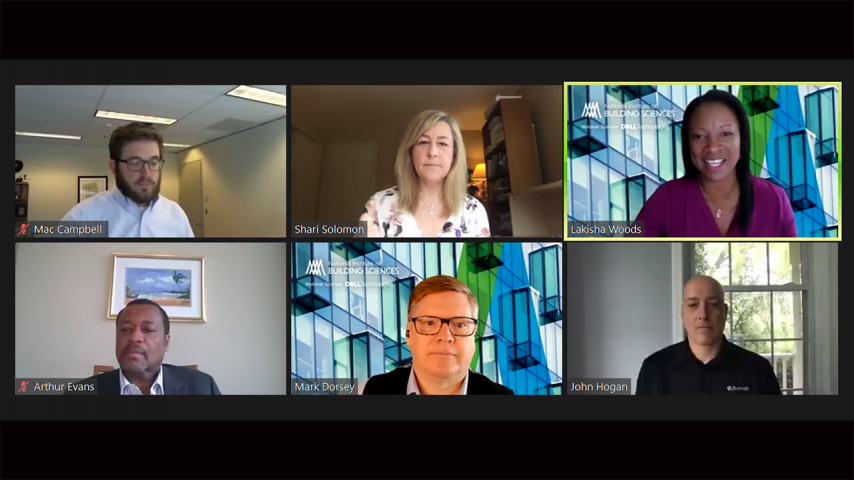
As states begin to reopen in phases, it’s important to psychologically prepare your staff to go back to work and attend meetings again.
There’s a lot of anxiety around the future of work, and one industry that’s been particularly affected is tourism and hospitality.
Experts say consistency will be critical toward building trust and credibility.
Arthur C. Evans, Jr., PhD, CEO of the American Psychological Association, says it’s important to communicate with employees and provide ample notice of plans.
Evans was one of the panelists from the second COVID-19 virtual town hall of the National Institute of Building Sciences.
“Your staff needs to know that you have their health and safety at heart,” said Lakisha A. Woods, CAE, President and CEO of NIBS. “Proper sanitization efforts are key. Employees, employers and future attendees should research what is being done to keep them safe.”
NIBS hosted the COVID-19 Virtual Town Hall: Mental Health and Sanitation of COVID-19 Facilities on May 19. It featured more than 800 registrants.
In addition to Evans, the panel included Michael (Mike) Schultz, SES, Chief of Interagency and International Services, United States Army Corps of Engineers; Mac Campbell, CTA, CVP, Deputy Director, Baltimore Convention Center; Shari L. Solomon, President and Founder, CleanHealth Environmental, LLC; and John Hogan, Vice President of Design and Project Management, Marriott Hotels. The town hall was moderated by Mark Dorsey, FASAE, CAE, CEO, Construction Specifications Institute.
Bringing Hotels, Meetings and Conventions Back Online
Marriott Hotels is using a multi-pronged platform to elevate its global cleanliness standard. The effort is being overseen by the Marriott Global Cleanliness Council, which maintains a number of experts and scientists, including epidemiology, and hygiene and technology experts.
The ultimate goal is to keep employees and guests safe.
The aim is to identify and deploy scientifically-supported practices. This includes an intensive deep clean after every guest stay, and more frequent cleanings and disinfection of high-touch areas, elevator buttons, escalator handrails, and public spaces, especially during peak usage.
Other things being considered include the removal of nonessential items from guest rooms, such as throw pillows.
With meetings and conventions, the Baltimore Convention Center is relying heavily on communication with staff and now is working through its plan for future meetings and events.
In March, the 1.2-million-square-foot center was contracted to become a medical station for 250 beds, serving COVID-19 convalescents. It currently has 1,500 medical personnel under its roof.
To keep everyone safe, the center has been able to isolate the building to serve this purpose, with separate systems for everything – air handlers, trash facilities, loading docks, and staff entrances for medical personnel.
Details for its future plan include revisiting front-of-the-house standards; food and beverage, which may be pre-packaged or boxed at the start; and event technologies to support meeting attrition or supplement social distancing.
On Sanitation: Creating a Permanent Cleaning and Disinfection Program
Proper cleaning and disinfection is key to bringing people back into the nation’s facilities.
Whereas in healthcare this always has been a focus, the rest of the world is catching up: We must clean and disinfect all different types of facilities and spaces.
Some things to consider:
- A comprehensive sanitation procedure will be necessary to ensure continuous infection prevention.
- Read the label. The time that a chemical must sit on a surface in order to be effective is a necessary consideration when cleaning and disinfecting.
- Staff training will ensure employees as well as the work environment remains protected.
CleanHealth Environmental’s Solomon said informing building occupants and employees will create assurance, making them more comfortable with returning to the office or facility.
“You must communicate what you’re doing, and that you’re following industry standards,” she said.
View the Virtual Town Hall Recording and Download the Recap
To view the recording and see the session notes of the virtual town hall, visit https://www.nibs.org/page/covid-19-virtual-town-hall-051920. The next virtual town hall is scheduled for June 2020.
Want to learn more? NIBS has launched a Building Industry COVID-19 Resource Hub on the WBDG site. Visit https://www.wbdg.org/industry-news. Let’s be social! We’re @bldgsciences on Twitter, or you can find us on Facebook.




